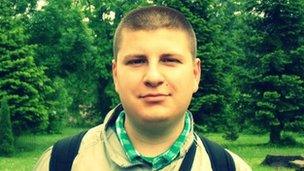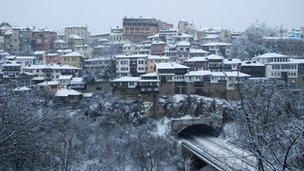Europe freeze: Your stories
- Published
At least 80 people have died due to freezing weather as a cold snap sweeps through eastern and central Europe.
Ukraine, Poland and Romania are among the worst hit with temperatures dropping as low as -32C during one of the coldest periods in decades.
BBC News website readers across Europe have been sharing their experiences.
Pavel Gramatikov, Veliko Tarnovo, Bulgaria

At the height of the cold snap the temperature fell to -30C. It's bone-chilling.
Millions of people have been advised to stay at home and avoid travelling, especially the most vulnerable. The cold weather has also shortened classroom lessons or in some cases shut schools. At least the students are happy.
Usually Bulgarians are adept at anticipating the change of season, but this winter weather has hit some parts hard.
However, like many people here, I have braved the bitter cold to go to work.
An army of local authority workers have gritted and cleared the roads to keep the traffic moving.
Reassuringly, in my town people are not struggling to buy food supplies or heat their homes.

Heavy snow has caused disruption across Europe. Photo of Veliko Tarnovo, Bulgaria by Pavel Gramatikov
There have been no reports of bulk-buying and the supermarket shelves are fully stocked.
Few people have central heating in their homes. It's too expensive. Some people are burning fire wood to stay warm.
I have an air-conditioning unit which is switched on to heat at full blast. People are adjusting to intermittent disruptions in their energy supplies but that is our biggest dilemma.
Bulgaria is heavily reliant on gas. Our biggest supplier is Russia. There are concerns that the bad weather might prompt Russia to impose rationing to prioritise and guarantee supplies to their own citizens.
Michael Meinel, Hajnowka, Poland
It feels as though we are at war with the cold. Severe frost has made conditions on pavements perilous.
The local authorities have concentrated their resources on ice clearance but as soon as grit and salt supplies are applied the pavements freeze over again.
It's virtually impossible to go out but people still do. I've witnessed a number of unfortunate accidents as the determined or foolhardy venture outside, armed with bulky coats and walking sticks, trying to defy the drifting snow and hazardous winds.
There have been a number of deaths across the country. The homeless have been particularly affected.
If you are sleeping rough in Warsaw or the countryside and you are exposed and it is -28C you don't wake up.
It's now -16C in Hajnowka, warm by most standards. There have been reports of pipes, which carry hot water, freezing and fracturing.
Many people living in old housing blocks have been left shivering in unheated apartments. I live in tall tower block with a sturdy communal heating system.
Fortunately, as an English language teacher I can afford to work from home. I don't go outside unless it is absolutely necessary.
One of my students lives 15 minutes from my home. It now takes her 35 minutes to reach my flat and start her lessons.
Serhii Komendant, Uzhhorod, Ukraine
Sub-zero conditions have made driving difficult and even hazardous. During the day temperatures start from -10C. At night it drops to below -20C. Black ice, piercing icicles and dense sleet makes my job even more challenging.
Local officials don't grit the back roads even though they have an obligation to keep the traffic moving.
I am a truck driver and I cannot count the number of times my lorry has almost careened into other vehicles.
It's not only people who have been affected by the bad weather. I live in a mountainous area populated with small streams. This makes the cold high winds even more severe.
Local people have been forced to lock up their domestic and farmyard animals. The dense snow has caused some roofs to collapse and you have to wear layers of clothing to feel warm.
My relatives in the eastern part of the country complain about the difficulties they have trying to buy basic food.
However, there is cause for optimism. Once the snow settles some of my neighbours, particularly young children, go outside and play, pelt their friends with snowballs, sledge down the hill and even build mini-snowmen.
Interviews by Elisabeth Ukanah
- Published31 January 2012